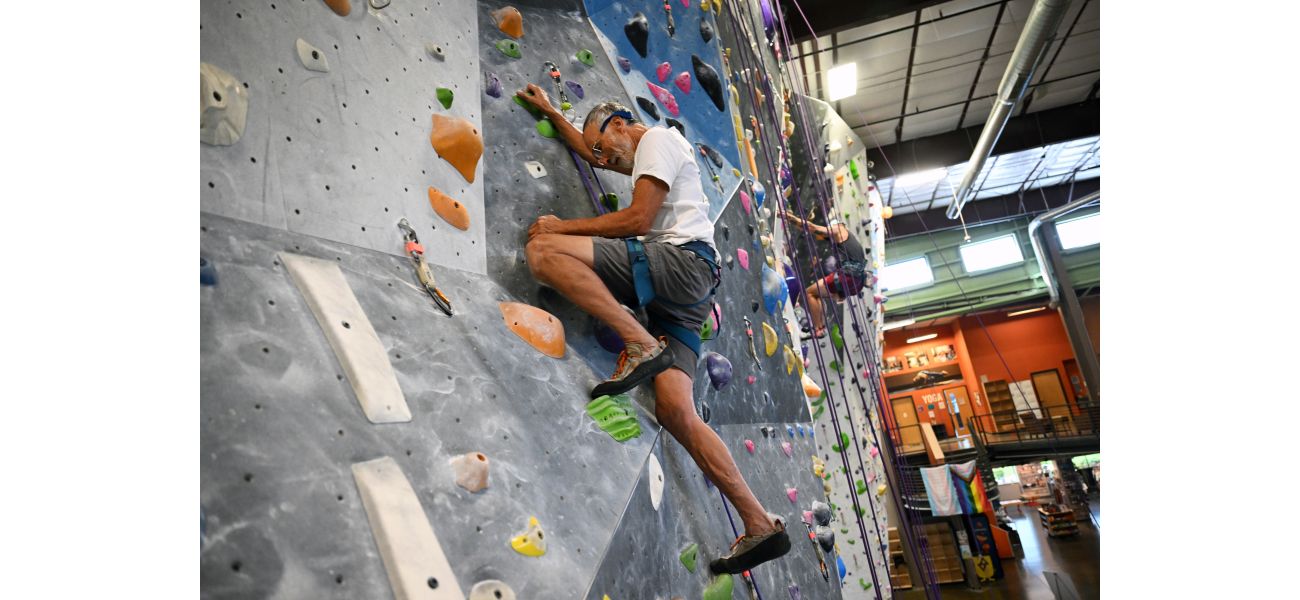A group in Colorado uses rock climbing to combat the effects of Parkinson's disease.
Physical activity is a powerful tool for managing Parkinson's and boosting dopamine levels.
September 21st 2024.

For the past 12 years, Paul Stroud has been tirelessly fighting against the effects of Parkinson's disease. He has undergone surgeries to implant stimulators in his brain and regularly takes medication to manage his symptoms. He even gave tai chi a try for a short period of time. However, in recent months, the 71-year-old has discovered a new and effective form of therapy that he had never considered before – rock climbing.
At the Movement gym in Golden, Stroud leaves his walker behind and dons a harness to scale the climbing wall. As he pulls himself up, he feels his struggles with Parkinson's, including issues with balance and tremors, fade away. Stroud admits that he is not a huge fan of heights, but the sense of accomplishment and the knowledge that he is doing something beneficial for himself makes the experience worth it.
Stroud is part of a group that meets every Tuesday morning to climb together. This group is a local chapter of Up Ending Parkinson's, a non-profit organization based in Virginia that offers guided rock climbing for those living with the disease. The group was started by Doug Redosh, a 70-year-old resident of Applewood. Redosh, a former neurologist, was diagnosed with Parkinson's six years ago and has a deep understanding of the disease from both a medical and personal standpoint. He has been an avid climber for 50 years and saw an opportunity to combine his passion for the sport with his battle against Parkinson's.
In February, Redosh came across an article in Outside Magazine about Up Ending Parkinson's, and it gave him a new lease on life. He was inspired to start a climbing program in Golden, and since then, he has seen a significant improvement in his own symptoms. Not only has climbing been physically beneficial for Redosh, but it has also provided him with a renewed sense of purpose and motivation.
The climbing group in Golden has attracted other individuals with Parkinson's, including Stroud. They gather every week to support each other and push themselves to new heights, both figuratively and literally. Redosh hopes that this program will continue to grow and offer relief and support to those affected by Parkinson's.
In addition to the physical and emotional benefits, the group also offers a sense of community and camaraderie. They share a common bond and understand the challenges that come with living with Parkinson's. Climbing has become a powerful tool for these individuals to combat the disease and live a fulfilling life. As Stroud puts it, "I'm not just climbing a wall; I'm fighting Parkinson's."
For the past 12 years, Paul Stroud has been doing everything in his power to combat the effects of Parkinson's disease. He has undergone a deep brain stimulation surgery, takes regular medications, and even tried tai chi for a brief period. However, in the last couple of months, the 71-year-old has discovered a new form of therapy that has proven to be very effective for him - rock climbing.
At the Movement gym in Golden, Stroud sheds his walker and puts on a harness to scale the climbing wall. As he pulls himself up, he feels his battle with Parkinson's and its accompanying issues of balance and tremors dissipating. "I have a fear of heights, so I'm not crazy about climbing up the wall. But it's surprisingly fun and rewarding," says the Littleton resident. "I have been steadily improving in my climbing abilities and I am now able to complete routes that I couldn't before. It's a great feeling of accomplishment and I feel like I am doing something good for myself in fighting this disease."
Stroud is a part of a weekly climbing session for people with Parkinson's disease that meets every Tuesday morning in Golden. This group is a local chapter of Up Ending Parkinsons, a non-profit organization based in Virginia that provides guided rock climbing for individuals living with this neurodegenerative disorder. The disease affects an estimated one million Americans.
The group in Golden was started by Doug Redosh, a 70-year-old resident of Applewood. Redosh, a former neurologist, was diagnosed with Parkinson's about six years ago and has a deep understanding of the disease after watching his patients and his father battle through it. He has been a climber for over 50 years and saw an opportunity to combine his love for the sport with his fight against the disease.
"When I read an article about Up Ending Parkinsons in Outside Magazine in February, it was like a new lease on life for me," says Redosh. "That motivated me to start this climbing program here in Golden. Since then, I have been climbing more frequently and I feel better overall."
The climbing sessions in Golden have been a great success, with participants reporting a positive impact on their physical and mental well-being. The group also provides a sense of community and support for individuals living with Parkinson's.
The climbing program in Golden is just one example of the growing trend of using outdoor activities as a form of therapy for individuals with Parkinson's disease. With its physical and mental challenges, rock climbing has proven to be a beneficial activity for those with the disorder.
Redosh hopes to continue expanding the climbing program and reach more people with Parkinson's in the future. He believes that with the right support and resources, individuals with Parkinson's can continue to lead an active and fulfilling life. As he puts it, "there's no mountain too high when it comes to fighting Parkinson's."
At the Movement gym in Golden, Stroud leaves his walker behind and dons a harness to scale the climbing wall. As he pulls himself up, he feels his struggles with Parkinson's, including issues with balance and tremors, fade away. Stroud admits that he is not a huge fan of heights, but the sense of accomplishment and the knowledge that he is doing something beneficial for himself makes the experience worth it.
Stroud is part of a group that meets every Tuesday morning to climb together. This group is a local chapter of Up Ending Parkinson's, a non-profit organization based in Virginia that offers guided rock climbing for those living with the disease. The group was started by Doug Redosh, a 70-year-old resident of Applewood. Redosh, a former neurologist, was diagnosed with Parkinson's six years ago and has a deep understanding of the disease from both a medical and personal standpoint. He has been an avid climber for 50 years and saw an opportunity to combine his passion for the sport with his battle against Parkinson's.
In February, Redosh came across an article in Outside Magazine about Up Ending Parkinson's, and it gave him a new lease on life. He was inspired to start a climbing program in Golden, and since then, he has seen a significant improvement in his own symptoms. Not only has climbing been physically beneficial for Redosh, but it has also provided him with a renewed sense of purpose and motivation.
The climbing group in Golden has attracted other individuals with Parkinson's, including Stroud. They gather every week to support each other and push themselves to new heights, both figuratively and literally. Redosh hopes that this program will continue to grow and offer relief and support to those affected by Parkinson's.
In addition to the physical and emotional benefits, the group also offers a sense of community and camaraderie. They share a common bond and understand the challenges that come with living with Parkinson's. Climbing has become a powerful tool for these individuals to combat the disease and live a fulfilling life. As Stroud puts it, "I'm not just climbing a wall; I'm fighting Parkinson's."
For the past 12 years, Paul Stroud has been doing everything in his power to combat the effects of Parkinson's disease. He has undergone a deep brain stimulation surgery, takes regular medications, and even tried tai chi for a brief period. However, in the last couple of months, the 71-year-old has discovered a new form of therapy that has proven to be very effective for him - rock climbing.
At the Movement gym in Golden, Stroud sheds his walker and puts on a harness to scale the climbing wall. As he pulls himself up, he feels his battle with Parkinson's and its accompanying issues of balance and tremors dissipating. "I have a fear of heights, so I'm not crazy about climbing up the wall. But it's surprisingly fun and rewarding," says the Littleton resident. "I have been steadily improving in my climbing abilities and I am now able to complete routes that I couldn't before. It's a great feeling of accomplishment and I feel like I am doing something good for myself in fighting this disease."
Stroud is a part of a weekly climbing session for people with Parkinson's disease that meets every Tuesday morning in Golden. This group is a local chapter of Up Ending Parkinsons, a non-profit organization based in Virginia that provides guided rock climbing for individuals living with this neurodegenerative disorder. The disease affects an estimated one million Americans.
The group in Golden was started by Doug Redosh, a 70-year-old resident of Applewood. Redosh, a former neurologist, was diagnosed with Parkinson's about six years ago and has a deep understanding of the disease after watching his patients and his father battle through it. He has been a climber for over 50 years and saw an opportunity to combine his love for the sport with his fight against the disease.
"When I read an article about Up Ending Parkinsons in Outside Magazine in February, it was like a new lease on life for me," says Redosh. "That motivated me to start this climbing program here in Golden. Since then, I have been climbing more frequently and I feel better overall."
The climbing sessions in Golden have been a great success, with participants reporting a positive impact on their physical and mental well-being. The group also provides a sense of community and support for individuals living with Parkinson's.
The climbing program in Golden is just one example of the growing trend of using outdoor activities as a form of therapy for individuals with Parkinson's disease. With its physical and mental challenges, rock climbing has proven to be a beneficial activity for those with the disorder.
Redosh hopes to continue expanding the climbing program and reach more people with Parkinson's in the future. He believes that with the right support and resources, individuals with Parkinson's can continue to lead an active and fulfilling life. As he puts it, "there's no mountain too high when it comes to fighting Parkinson's."
[This article has been trending online recently and has been generated with AI. Your feed is customized.]
[Generative AI is experimental.]
0
0
Submit Comment





